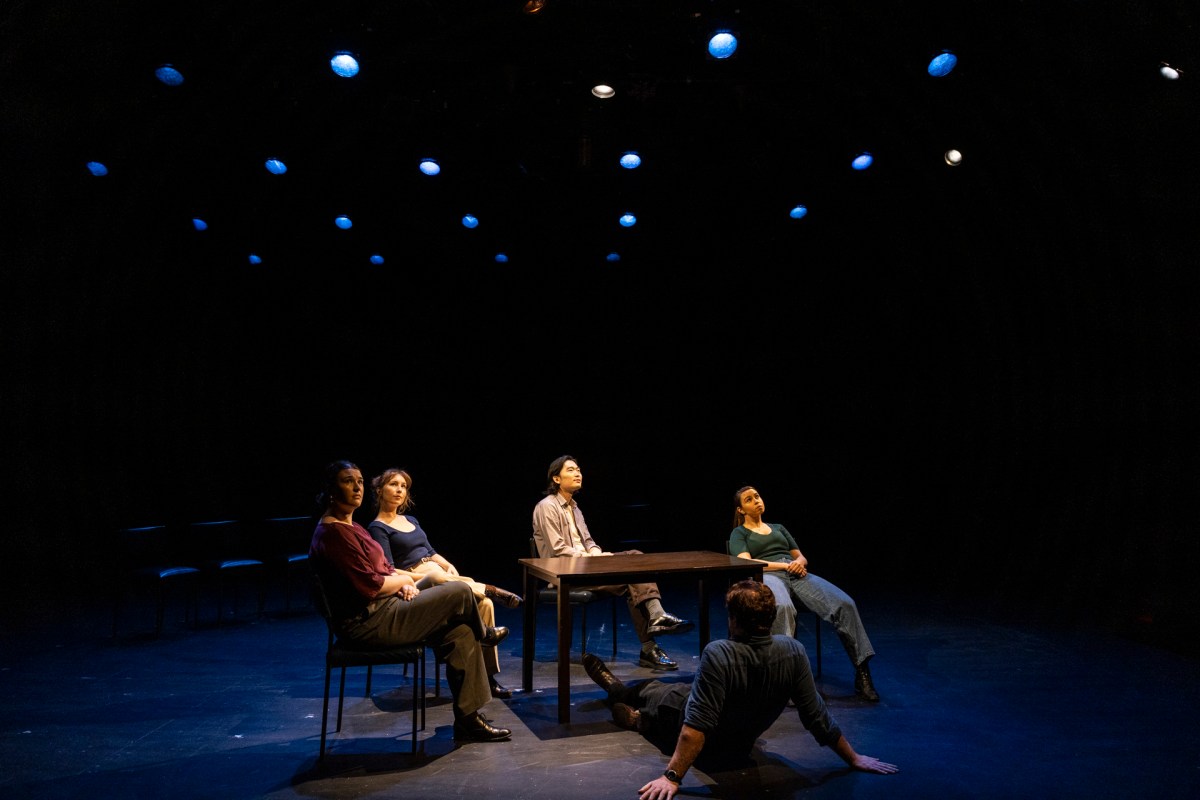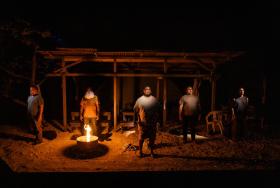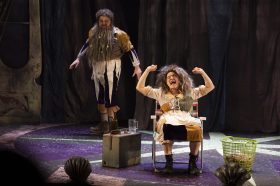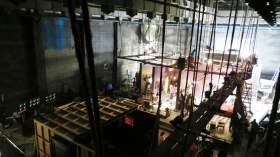The polarisation of climate change as an issue, and its use as political dog whistle, often co-opts and muddies conversations around the practicalities and ambiguities of living in the Anthropocene. Belvoir’s new play by David Finnigan, Scenes from the Climate Era, goes some way towards remedying that.
Climate and indeed all science is complex. There are clear reasons why academics have spent generations devoted to the study of the endless questions borne of their interaction with the universe. As a general populace, we often succumb to a feeling of overwhelm or, as it has been popularly labelled, #climatefatigue, therefore choosing ignorance (or at least selective outrage) over the noise of binary discourses about climate change and its impacts.
Perhaps we choose paper over plastic, take shorter showers, deny fast fashion or even buy an electric car trying to be a force for good in our own small way. Scenes from a Climate Era acknowledges our feelings of helplessness, sees our ambivalence, gives credence to our denial and reflects ourselves back to ourselves.
Finnigan is a playwright and games designer from Ngunnawal country. He collaborates with climate and earth scientists to create theatre and games that grapple with complex systems and planetary transformation. His time spent researching and thinking in the company of climate professionals has helped his thoughts settle into an insightful and snappy tapestry of over 50 small plays.
Each play forms part of a parallel structure, the pieces connected by theme and shared internal questions. Simply put, we journey through a selection of climate-related conversations set in the past, present and possible future.
Two weather scientists argue about the accuracy of climate modelling and the possibilities of either conceivable outcome being wrong.
An ecstatic man marvels at how his body now contains a high percentage of plastic due to the plastics in the oceans and agricultural loop.
A focus group in Mudgee NSW grills a government communications rep about the treatment of water in rural NSW, and the lack of governmental concern for the people on the ground and their lived expertise and knowledge of the area.
The last frog of its kind calls into an abyss for a mate – there is no one left to answer.
The idea of choosing between possible evils is a repeated internal question that is carefully and wryly dissected. A birder anguishes over the cost of wind farms to local birdlife; a young couple go from discussing paper or plastic to whether or not to have children.
The theme of hope rises up like the human spirit within the script. In one play a newsroom editor lectures a newly-hired atmospheric scientist of the virtues of rewording her reporting to be ‘hopeful’ in its content. The young scientist responds by calling it as it is – propaganda.
The staging of the production is tightly directed by Belvoir’s Resident Director Carissa Licciardello. The creative team has responded to the simplicity of the script by staging a bare bones-style production. The only onstage props are a table and five chairs, leaving the space open to the interpretation of the imagination.
Licciardello in partnership with Dramaturg Vaishnavi Suryaprakash have leant into the empty space by choreographing the seamless transitions of actors and props so that the whole piece never has a moment of clunkiness or unused silence. Instead, like a dance, it moves seamlessly from one piece to the next, forming a connected whole that links and intensifies the text and the audience’s emotions.
The cast, composed of Harriet Gordon-Anderson, Abbie-Lee Lewis, Brandon McClelland, Ariadne Sgouros and Charles Wu, respond to the text with a naturalistic and believable verve. Despite the varying levels of experience onstage, the cast combined as an ensemble with no disproportion in each player’s performance.
The strength of the piece is in its conscious rejection of the overtly didactic. Instead it teases out questions that toy with the abstract and border on the ridiculous, often leaving the audience laughing, less because of the script and performers being intentionally funny, but more because we see ourselves reflected on stage.
Read: Film installation review: Euphoria, RISING
I found this piece quite relieving. In a world that has become so averse to having difficult and highly nuanced conversations about many important topics, Scenes from a Climate Era is delightfully open-ended, allowing the audience to engage and consider so many opinions, possibilities and circumstances, particularly those of rural Australians. While the play is highly entertaining, when this reviewer attended it also did what much cleverly constructed art does, and left the audience thoughtful and talkative in ways that we weren’t when we first took our seats.
Scenes from a Climate Era by David Finnigan
Director: Carissa Licciardello
Set and Lighting Designer: Nick Schlieper
Costume Designer: Ella Butler
Composer and Sound Designer: David Bergman
Vocal Coach: Laura Farrell
Assistant Director: Clement Rukundo
Dramaturg: Vaishnavi Suryaprakash
Stage Manager: Luke McGettigan
Assistant Stage Manager: Christopher Starnawski
Cast: Harriet Gordon-Anderson, Abbie-Lee Lewis, Brandon McClelland, Ariadne Sgouros, Charles Wu
Tickets: $37-$93
Scenes from a Climate Era will be performed until 25 June 2023.





